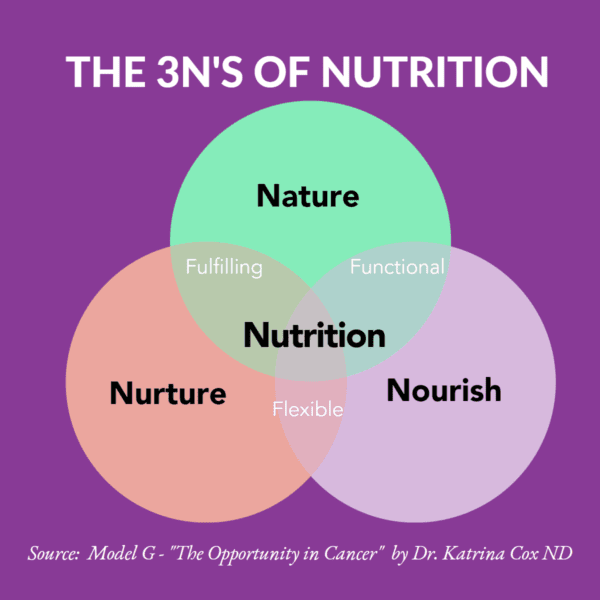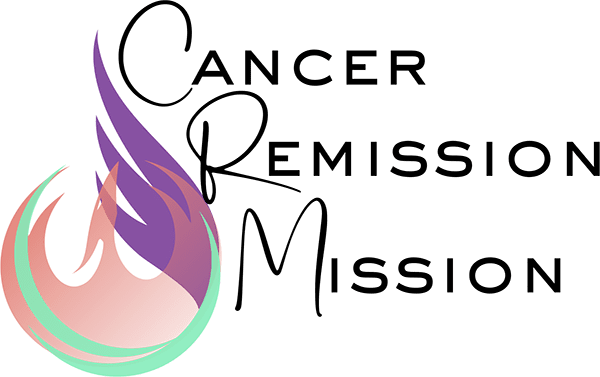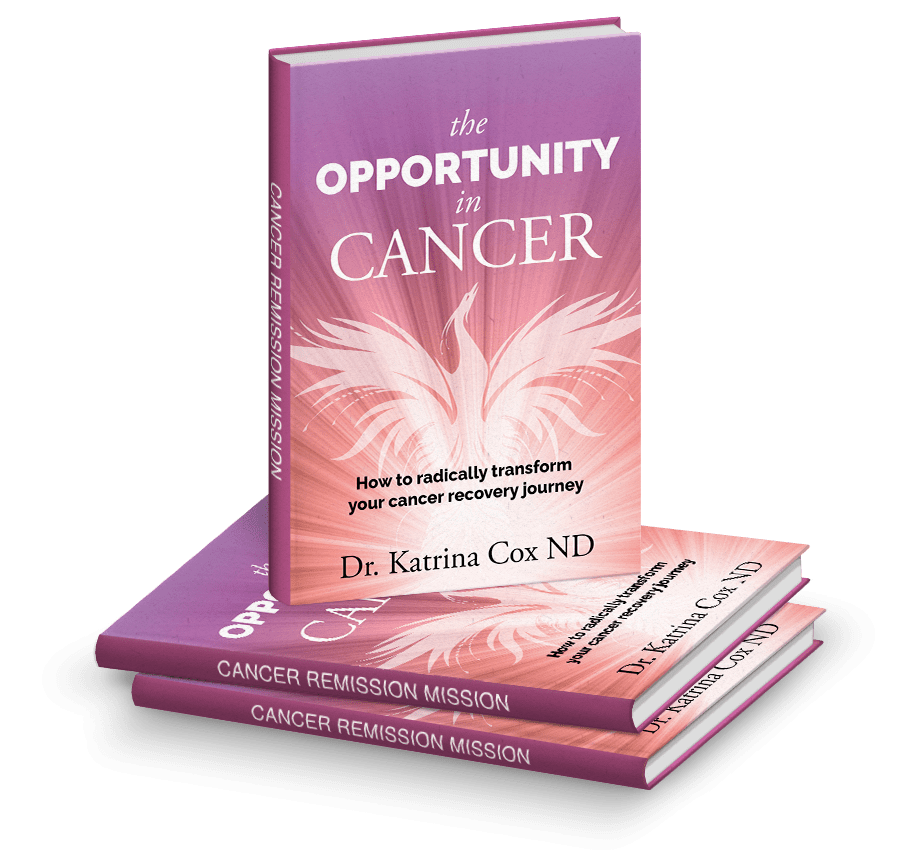March is Nutrition Month. What better time to talk about the important role of nutrition in cancer recovery, in particular, in cancer remission? Many cancer survivors look to lifestyle changes, including nutrition and dietary approaches to help reduce their risk of recurrence. Nutrition is an integral part of my approach to improving health for my clients In cancer remission.
In this day and age of digital information being at your fingertips and social media influencers giving out information, it can be overwhelming and difficult to determine what is best. Understanding what to eat can start to feel complicated.
The most important thing about nutrition is that you need to make an individualized plan. Everyone’s palette is different, everyone’s lifestyles are different, and their experience with food is different. Instead of providing you with “rules” about what foods to eat, and what not to eat, I want to empower you with the information to build a healthy foundation in nutrition that works for you.
It’s Not One-Size-Fits All
Early on in my practice when I was working with a colon cancer survivor. She came to me struggling with pain in her abdomen. The pain was so bad that she was on high doses of pain relievers. No one could explain where the pain was coming from.
Some believed it was phantom pain. As part of her cancer treatment, she had a large portion of her colon removed through surgery, in addition to chemotherapy. Despite recovering well from her surgery and treatment, she just could not get away from the pain.
At some point along the way, a well-intentioned practitioner that she had been working with had told her that she needed to eat raw and follow a ketogenic diet, in order to reduce her risk of recurrence. Although there may be some research on the use of these dietary approaches, this is an eating strategy that can cause problems for someone that is missing part of their bowel as it would inherently be more difficult to digest.
We first worked on introducing some warm broth every day into her diet. Simply by doing this, we were able to get the pain down by 10 to 15%. This allowed her to reduce the use of breakthrough pain medications. This small win was enough to convince her that maybe we needed more supportive changes to her diet.
We looked at her diet as a whole and created a comprehensive plan for her nutritional well being. We took that raw diet and we made it so that she was never eating anything that wasn’t lightly steamed or cooked. This seemingly small change, made it so that she was able to come off of all of her medication and the griping pain was gone.
The 3 N’s of Nutrition

The 3 Ns of Nutrition is a framework I use to help create a balanced nutrition care plan for cancer survivors and ensures we are taking an individualized approach. The 3 N’s are Nurture, Nature and Nourish.
In the case of this colon cancer survivor, we made sure that the food that she was eating was nourishing her body, that the food that she was choosing to eat came from nature (ie. focused on whole foods rather than processed) and that the foods we were including provided some nurturing and comfort for her body.
Originally, her diet included foods from nature because it was a whole-food based diet, and she did feel like it was nourishing her based on everything else. Ultimately, the nurture part was a piece that was what was missing originally. By changing it to slightly steamed vegetables and making some slight changes, it made a huge difference. She was able to come off of all of her pain medication, which was phenomenal.
Take Blanket Statements with a “Grain of Salt”
It’s important for us to always look at nutrition information carefully. The other day, I saw someone say on Instagram that there’s a study that showed that breast cancer survivors should follow a plant-based diet (e.g. vegetarian, vegan).
Despite it being a large study, it was a short study, looking at changes over 12 days of following a plant-based diet. Those who participated showed a reduction in all of their cancer monitoring blood markers across the board. However, 12 days does not a lifestyle change make. How many of those people would’ve been able to do that beyond 12 days? And did they get the appropriate support to continue cooking plant-based meals on their own?
It is not surprising that improvements were noted on a plant-based diet, since it is quite different from the normal North American diet (sometimes called the Standard American Diet or “SAD”), which does not include a lot of food from nature and doesn’t encourage the nourishing part. However, what we cannot be certain of from these findings is whether participants felt “nurtured” or at ease with these foods that were included.
From my perspective, that study could possibly do a little bit more harm than good, because 12 days does not tell us if this nutrition approach is sustainable or enjoyable for most people.
Is it possible to enjoy great food on a plant-based diet and eat well? Absolutely! For some it is a way of eating that supports the 3 N’s – Nurture, Nature and Nourish. However, that is not universally true. Without an understanding of how to include the right balance of different foods to ensure you are getting enough of your macronutrients (protein, carbohydrates and fats) and micronutrients (Vitamin B12, iron, etc.), someone already depleted from cancer treatment could run into trouble. Equally, some won’t tolerate a high fibre diet like a plant based diet well, simply because of the type of cancer they’ve had, how their digestion works, the types of foods that they like, and so on.
Making Meals That Work For You
There are lots of healthy ways to put together a diet. The best place to start is on the 3 N’s of Nutrition. What we need to do is really look at those basics and allow our body to recover well.
Here are the 2 key pieces of advice I give to any cancer survivor interested in improving their health through nutrition:
- Make an individualized plan – It is okay to create an approach to eating that works just for you. You can take different “best practices” and make it your own. Avoid a “cut and paste” meal plan, instead always asking “does this work well for me?” If it’s not working for you, then it’s not the right nutritional plan.
- Remember that healthy eating is more than calories in, calories out. Make sure that you are eating in a way that not only replenishes your body, but also supports a way of eating that you can enjoy.
If you are interested in more discussion about how to use the 3 N’s to build a nutrition plan that works for you, come join us on our Facebook group on Social – Remission Mission Community.
March is Nutrition Month. What better time to talk about the important role of nutrition in cancer recovery, in particular, in cancer remission? Many cancer survivors look to lifestyle changes, including nutrition and dietary approaches to help reduce their risk of recurrence. Nutrition is an integral part of my approach to improving health for my clients In cancer remission.
In this day and age of digital information being at your fingertips and social media influencers giving out information, it can be overwhelming and difficult to determine what is best. Understanding what to eat can start to feel complicated.
The most important thing about nutrition is that you need to make an individualized plan. Everyone’s palette is different, everyone’s lifestyles are different, and their experience with food is different. Instead of providing you with “rules” about what foods to eat, and what not to eat, I want to empower you with the information to build a healthy foundation in nutrition that works for you.
It’s Not One-Size-Fits All
Early on in my practice when I was working with a colon cancer survivor. She came to me struggling with pain in her abdomen. The pain was so bad that she was on high doses of pain relievers. No one could explain where the pain was coming from.
Some believed it was phantom pain. As part of her cancer treatment, she had a large portion of her colon removed through surgery, in addition to chemotherapy. Despite recovering well from her surgery and treatment, she just could not get away from the pain.
At some point along the way, a well-intentioned practitioner that she had been working with had told her that she needed to eat raw and follow a ketogenic diet, in order to reduce her risk of recurrence. Although there may be some research on the use of these dietary approaches, this is an eating strategy that can cause problems for someone that is missing part of their bowel as it would inherently be more difficult to digest.
We first worked on introducing some warm broth every day into her diet. Simply by doing this, we were able to get the pain down by 10 to 15%. This allowed her to reduce the use of breakthrough pain medications. This small win was enough to convince her that maybe we needed more supportive changes to her diet.
We looked at her diet as a whole and created a comprehensive plan for her nutritional well being. We took that raw diet and we made it so that she was never eating anything that wasn’t lightly steamed or cooked. This seemingly small change, made it so that she was able to come off of all of her medication and the griping pain was gone.
The 3 N’s of Nutrition

The 3 Ns of Nutrition is a framework I use to help create a balanced nutrition care plan for cancer survivors and ensures we are taking an individualized approach. The 3 N’s are Nurture, Nature and Nourish.
In the case of this colon cancer survivor, we made sure that the food that she was eating was nourishing her body, that the food that she was choosing to eat came from nature (ie. focused on whole foods rather than processed) and that the foods we were including provided some nurturing and comfort for her body.
Originally, her diet included foods from nature because it was a whole-food based diet, and she did feel like it was nourishing her based on everything else. Ultimately, the nurture part was a piece that was what was missing originally. By changing it to slightly steamed vegetables and making some slight changes, it made a huge difference. She was able to come off of all of her pain medication, which was phenomenal.
Take Blanket Statements with a “Grain of Salt”
It’s important for us to always look at nutrition information carefully. The other day, I saw someone say on Instagram that there’s a study that showed that breast cancer survivors should follow a plant-based diet (e.g. vegetarian, vegan).
Despite it being a large study, it was a short study, looking at changes over 12 days of following a plant-based diet. Those who participated showed a reduction in all of their cancer monitoring blood markers across the board. However, 12 days does not a lifestyle change make. How many of those people would’ve been able to do that beyond 12 days? And did they get the appropriate support to continue cooking plant-based meals on their own?
It is not surprising that improvements were noted on a plant-based diet, since it is quite different from the normal North American diet (sometimes called the Standard American Diet or “SAD”), which does not include a lot of food from nature and doesn’t encourage the nourishing part. However, what we cannot be certain of from these findings is whether participants felt “nurtured” or at ease with these foods that were included.
From my perspective, that study could possibly do a little bit more harm than good, because 12 days does not tell us if this nutrition approach is sustainable or enjoyable for most people.
Is it possible to enjoy great food on a plant-based diet and eat well? Absolutely! For some it is a way of eating that supports the 3 N’s – Nurture, Nature and Nourish. However, that is not universally true. Without an understanding of how to include the right balance of different foods to ensure you are getting enough of your macronutrients (protein, carbohydrates and fats) and micronutrients (Vitamin B12, iron, etc.), someone already depleted from cancer treatment could run into trouble. Equally, some won’t tolerate a high fibre diet like a plant based diet well, simply because of the type of cancer they’ve had, how their digestion works, the types of foods that they like, and so on.
Making Meals That Work For You
There are lots of healthy ways to put together a diet. The best place to start is on the 3 N’s of Nutrition. What we need to do is really look at those basics and allow our body to recover well.
Here are the 2 key pieces of advice I give to any cancer survivor interested in improving their health through nutrition:
- Make an individualized plan – It is okay to create an approach to eating that works just for you. You can take different “best practices” and make it your own. Avoid a “cut and paste” meal plan, instead always asking “does this work well for me?” If it’s not working for you, then it’s not the right nutritional plan.
- Remember that healthy eating is more than calories in, calories out. Make sure that you are eating in a way that not only replenishes your body, but also supports a way of eating that you can enjoy.
If you are interested in more discussion about how to use the 3 N’s to build a nutrition plan that works for you, come join us on our Facebook group on Social – Remission Mission Community.




